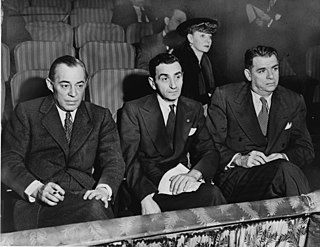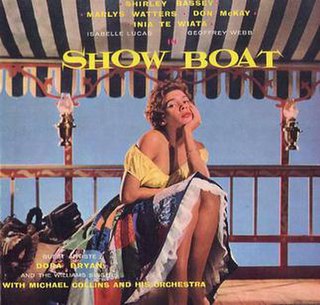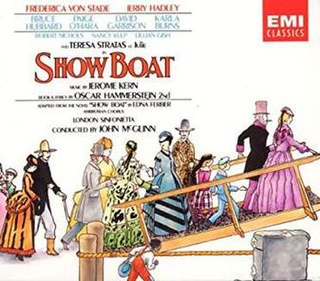Related Research Articles

Jerome David Kern was an American composer of musical theatre and popular music. One of the most important American theatre composers of the early 20th century, he wrote more than 700 songs, used in over 100 stage works, including such classics as "Ol' Man River", "Can't Help Lovin' Dat Man", "A Fine Romance", "Smoke Gets in Your Eyes", "The Song Is You", "All the Things You Are", "The Way You Look Tonight" and "Long Ago ". He collaborated with many of the leading librettists and lyricists of his era, including George Grossmith Jr., Guy Bolton, P. G. Wodehouse, Otto Harbach, Oscar Hammerstein II, Dorothy Fields, Johnny Mercer, Ira Gershwin and Yip Harburg.

Rodgers and Hammerstein refers to the duo of composer Richard Rodgers (1902–1979) and lyricist-dramatist Oscar Hammerstein II (1895–1960), who together were an influential, innovative and successful American musical theatre writing team. They created a string of popular Broadway musicals in the 1940s and 1950s, initiating what is considered the "golden age" of musical theatre. Five of their Broadway shows, Oklahoma!, Carousel, South Pacific, The King and I and The Sound of Music, were outstanding successes, as was the television broadcast of Cinderella (1957). Of the other four shows that the team produced on Broadway during their lifetimes, Flower Drum Song was well-received, and none was an outright flop. Most of their shows have received frequent revivals around the world, both professional and amateur. Among the many accolades their shows garnered were thirty-four Tony Awards, fifteen Academy Awards, two Pulitzer Prizes and two Grammy Awards.

Show Boat is a musical with music by Jerome Kern, lyrics by Oscar Hammerstein II and P. G. Wodehouse, and a book by Hammerstein II. It is based on Edna Ferber's best-selling 1926 novel of the same name. The musical follows the lives of the performers, stagehands and dock workers on the Cotton Blossom, a Mississippi River show boat, over 40 years from 1887 to 1927. Its themes include racial prejudice and tragic, enduring love. The musical contributed such classic songs as "Ol' Man River", "Make Believe", and "Can't Help Lovin' Dat Man".
"Ol' Man River" is a show tune from the 1927 musical Show Boat that contrasts the struggles and hardships of African Americans with the endless, uncaring flow of the Mississippi River. It is sung from the point of view of a Black stevedore on a showboat, and is the most famous song from the show. The song is meant to be performed in a slow tempo, it is sung complete once in the musical's lengthy first scene by the stevedore "Joe" who travels with the boat, and, in the stage version, is heard four more times in brief reprises. Joe serves as a sort of musical one-man Greek chorus, and the song, when reprised, comments on the action, as if saying, "This has happened, but the river keeps rolling on anyway."
Show Boat is a 1936 romantic musical film directed by James Whale, based on the 1927 musical of the same name by Jerome Kern and Oscar Hammerstein II, which in turn was adapted from the 1926 novel of the same name by Edna Ferber.

Till The Clouds Roll By is a 1946 American Technicolor musical film produced by Metro-Goldwyn-Mayer. It is a fictionalized biopic of composer Jerome Kern, portrayed by Robert Walker. Kern was originally involved with the production, but died before it was completed. It has a large cast of well-known musical stars of the day who appear performing Kern's songs. It was the first in a series of MGM biopics about Broadway's composers; it was followed by Words and Music, Three Little Words, and Deep in My Heart.

Show Boat is a 1929 American romantic drama film based on the 1926 novel Show Boat by Edna Ferber. The film initially did not use the 1927 stage musical of the same name as a source, but scenes were later added into the film incorporating two of the songs from the musical as well as other songs. This version was released by Universal in two editions, one a silent film for movie theatres still not equipped for sound, and one a part-talkie with a sound prologue.
"Can't Help Lovin' Dat Man" with music by Jerome Kern, and lyrics by Oscar Hammerstein II, is one of the most famous songs from their classic 1927 musical play Show Boat, adapted from Edna Ferber's 1926 novel.
Gaylord Ravenal is the leading male character in Edna Ferber's 1926 novel Show Boat, in the famous Jerome Kern-Oscar Hammerstein II 1927 musical play of the same name based on the novel, and in the films made from it. He is a handsome, compulsive riverboat gambler, and he becomes leading man of the show boat Cotton Blossom at the same time that Magnolia Hawks, the captain's daughter, becomes the leading lady. In the novel, this happens after several of the company's leading men and ladies have left, including the illegally married mulatto Julie Dozier and her white husband Steve Baker. In the musical, Magnolia and Ravenal become the leading players on the boat immediately after Julie and Steve are forced to leave the show, not years later.
Sunny is a musical with music by Jerome Kern and a libretto by Oscar Hammerstein II and Otto Harbach. The plot involves Sunny, the star of a circus act, who falls for a rich playboy but comes in conflict with his snooty family. This show was the follow-up to the 1920 hit musical Sally, both starring Marilyn Miller in the title roles, and it was Kern's first musical together with Hammerstein. Sunny also became a hit, with its original Broadway production in 1925 running for 517 performances. The London production starred Binnie Hale.
"I Won't Dance" is a jazz standard song with music by Jerome Kern, that has had two different sets of lyrics, the first written by Oscar Hammerstein II and Otto Harbach in 1934, the second written by Dorothy Fields in 1935. The two sets of lyrics share little but the common refrain of "I won't dance". The second set of lyrics is the much better known one, and the song in this form has been covered by many artists.

Music in the Air is a musical written by Oscar Hammerstein II and Jerome Kern (music). It introduced songs such as "The Song Is You", "In Egern on the Tegern See" and "I've Told Ev'ry Little Star". The musical premiered on Broadway in 1932, and followed the team's success with the musical Show Boat from 1927.
Julie Dozier is a character in Edna Ferber's 1926 novel Show Boat. In the Jerome Kern and Oscar Hammerstein II's classic musical version of it, which opened on Broadway on December 27, 1927, her stage name is Julie La Verne. She is exposed as Julie Dozier in Act I. In Act II, Julie has changed her name, this time to Julie Wendel.

Show Boat is a 1951 American musical romantic comedy-drama film, based on the 1927 stage musical of the same name by Jerome Kern (music) and Oscar Hammerstein II, and the 1926 novel by Edna Ferber. It was made by MGM, adapted for the screen by John Lee Mahin, produced by Arthur Freed and directed by George Sidney.
Mis'ry's Comin' Aroun is a once-neglected song from the 1927 musical Show Boat by Jerome Kern and Oscar Hammerstein II. It was cut from the production during the Washington D.C. tryout on the orders of producer Florenz Ziegfeld, supposedly because it was one of the factors that made the show too long. However, musical theatre historian Miles Kreuger and conductor John McGlinn, also suggest that it was the dark, dramatic tone of the piece that most concerned Ziegfeld. Kern was reportedly so incensed by the deletion of "Mis'ry's Comin' Aroun" that he made it the principal motif of Show Boat's original overture and asked orchestrator Robert Russell Bennett to work sections of it into the background music as well, where it is now played by the orchestra during some of the dialogue scenes involving the mixed race actress Julie La Verne.
"Bill" is a song heard in Act II of Kern and Hammerstein's classic 1927 musical Show Boat. The song was written by Kern and P.G. Wodehouse for their 1917 musical Oh, Lady! Lady!! for Vivienne Segal to perform, but withdrawn because it was considered too melancholy for that show. However, when Kern and Hammerstein were at work on the serious and somewhat tragic Show Boat, they decided that the song would be perfect for a nightclub scene in the show. Hammerstein revised Wodehouse's original lyrics somewhat, and the song was given to real-life nightclub singer Helen Morgan, who portrayed the mulatto Julie in Show Boat, to sing.
"Make Believe" is a show tune from the 1927 Broadway musical Show Boat with music by Jerome Kern and lyrics by Oscar Hammerstein II.

Show Boat is a studio recording of the 1927 musical Show Boat by Jerome Kern and Oscar Hammerstein II. The album was recorded in the summer of 1959 at the No.1 studio, Abbey Road, London, and issued by the 'His Master's Voice' label, a subsidiary of EMI, which was run at this time by Norman Newell. It features a cast that was formed for this recording only; this cast did not perform the show live in any theatre production.

Show Boat is a 221-minute studio album of Jerome Kern's musical, performed by a cast headed by Karla Burns, Jerry Hadley, Bruce Hubbard, Frederica von Stade and Teresa Stratas with the Ambrosian Chorus and the London Sinfonietta under the direction of John McGlinn. It was released in 1988.
References
- ↑ www.amazon.com https://www.amazon.com/Jerome-SHEET-pristine-condition-musical/dp/B07J253N1W . Retrieved 2019-08-04.Missing or empty
|title=(help) - ↑ "You Are Love Lyrics - Show Boat musical". www.allmusicals.com. Retrieved 2019-08-04.
- ↑ "Show Boat (Goodspeed Version) - The Guide to Musical Theatre - Shows S". www.guidetomusicaltheatre.com. Retrieved 2019-08-04.
- ↑ "Show Boat". www.theatrehistory.com. Retrieved 2019-08-04.
- ↑ "Showboat - Kern/Hammerstein". www.guidetomusicaltheatre.com. Retrieved 2019-08-04.
- ↑ Block, Geoffrey (2009-10-30). Enchanted Evenings: The Broadway Musical from 'Show Boat' to Sondheim and Lloyd Webber. Oxford University Press. ISBN 9780199741502.
| | This 1920s song article is a stub. You can help Wikipedia by expanding it. |